Midday in Jerusalem
Weird Serial Fiction With Middle Eastern
Settings
The Agony Column for Monday, April 22,
2002
Commentary by Rick Kleffel
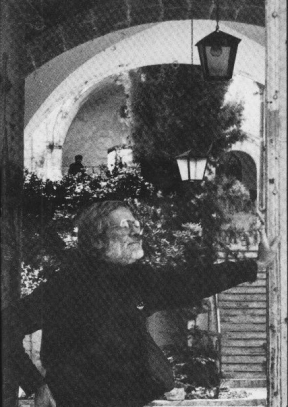
|
|
Edward Whittemore lived in Jerusalem while he wrote
the Jerusalem Quartet. Alas, this incredible bit of writing
never quite caught the attention of the literary readers or
the readers of fantastic fiction, though it was sort of
marketed to both. This summer, Old Earth Publishing hopes to
resurrect the five novels he wrote.
|
Books about the Middle East are flying off the shelf so fast
booksellers practically need a gattling gun to eject them. Most of
these are reprehensible instant books of varying pedigree, catering
to the fear Americans feel since the destruction of the World Trade
Towers over seven months ago. I can't say whether any of them are
worth the reader's time. I don't intend to buy or read any of them.
While I understand that people are curious about aspects of a culture
they used to ignore but now find shoved in their faces, I don't
particularly share their curiosity, and I don't think that
Johnny-come-lately learning serves to do anything other than confirm
existing fears and prejudices.
After all this whinging about crass commercialism and mass
mentality, I can parade my utter hypocrisy by admitting that I'm
currently reading a fascinating series of books about -- the Middle
East. Most of my Middle Eastern reading has been in the field of
weird literature. There's been a fair amount of great Middle
Eastern-oriented weird books published. I'll start with (what I think
are) the basics, and end up with the Arabesks, a wonderful new set of
novels from Jon Courtenay Grimwood.
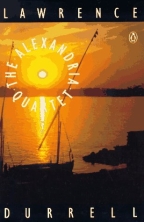
|
|
Lawrence Durrell's Alexandria Quartet set the standard
for a fictional series set in the middle east. He made the
setting a character and performed grand literary
experiments, but the Nobel Prize escaped him.
|
The most basic -- and least 'weird' -- sets of books about the
Middle East come from Lawrence Durrell (1912-1990). I've read two
series by this writer, and they both stuck with long afterwards. The
first was 'The Alexandria Quartet', which was once thought certain to
earn Durrell a Nobel Prize for Literature. 'The Alexandria Quartet'
is comprised of the novels 'Justine' (1957), 'Balthazar (1958),
Mountolive (1959) and Clea (1960). He followed this with a duet of
science fiction novels -- 'Tunc' about the invention of a
supercomputer named Abel, the second 'Nunquam', about the creation of
a perfect robotic woman. All of them are probably the sort of novels
best enjoyed while you're in college. But for all their overheated
fervor -- and there's a lot of it -- the mark they make on the reader
and have made in the literary landscape is indelible.
In the Alexandria Quartet, the Middle East becomes a character. A
set of events described by one character is told differently when
recounted by another. Durrell explores sexual ambiguity, extremes of
passion, espionage and addiction with an enthusiasm that is itself
lurid. He torments the normal novelistic form, inverting the
importance of events and subverting the consistency of the
characters. Like a languid hangover afternoon, the novels spend long
stretches staring at their surroundings. When they came out their
were revolutionary, visionary. Now they are more like elder
revolutionaries and one-time seers, still mysterious but crinkled
with the lines of an age gone by. They are still striking, but they
failed to change the world. It's not an uncommon fate, especially
when the movie adaptation flops, as did 'Justine'.
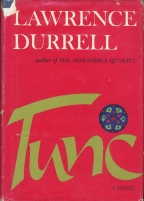
|
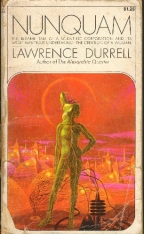
|
|
In 'Tunc', Durrell included science fiction themes in
his work. 'Tunc' details the creation of a superncomputer
named Abel, and host of neuroses embodied in characters who
have gone out beyond the edge. I spent five days trying to
find this damn book in my library.
|
Any guesses as to what decade saw the publication of
this book, based on the cover art? 'Nunquam' has the
scientist from 'Tunc' creating an artificial woman. I
managed to find this 31-year old paperback before I could
find that hardcover book.
|
'Tunc' and 'Nunquam' can in retrospect be seen as the first
tenuous explorations into what might later become known as cyberpunk.
They were concerned with technology that mimicked thought that looked
human and was better than human without actually being human. They
were also a tip of the hat to the omnipresence of the corporate
entity. I'll never forget the scheme from 'Nunquam' where a
corporation subsidizes then popularizes the practice of mummification
so that their laboratories, the ones who do perform the process, have
plenty of human bodies to study. 'Never forget' is a phrase you'll
hear associated with Durrell a lot.
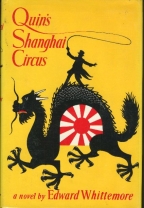
|
|
The first novel by Edward Whittemore was actually set
in Shanghai, but many of the characters pop up in his
'Jerusalem Quartet'. It's probably best to read this one
first, though it is certainly not necessary.
|
I found the next treatment of the Middle East in weird fiction at
the original Change of Hobbit bookstore, where Harlan Ellison once
sat to write a short story. I was looking for hardcover copies of
Lovecraft, and saw 'Sinai Tapestry' by Edward Whittemore on the
shelf. A completely inaccurate comparison to 'Lord of the Rings' on
the cover must have drawn me in, and after I bought the book, I spent
the next 16 or so years finding and reading the sequels, only last
year finding the final book in the series. Like the Alexandria
Quartet, Whittemore's series -- the Jerusalem Quartet -- is set
largely (though not always) in the Middle East, featuring a set of
characters who explore the extremes of love, sex and addiction. But
Whittemore has a wider canvas and a different interest than Durrell.
His characters are all looking for the original Bible, which is said
to both confirm and deny the beliefs of all religions.
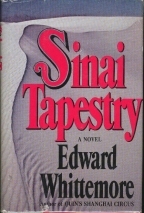
|
|
The first novel in Whittemore's 'Jerusalem Quartet'
was billed as having some similarities to 'Lord of the
Rings'. Both, in fact, were books. Otherwise...
|
Even the name of the series gives an idea of where Whittemore was
heading. He explores an intricate web of myths within myths, stories
intertwined and characters who include a 1,000-year-old grocer and
the seventh son of a seventh son. When Whittemore wants to hit you,
he uses the same ammo that Durrell used: evocative locations and
memorable details that pin down specific events on a vast Middle
Eastern canvas. But Whittemore has a grander tale in mind, and pulls
it off over the span of the four novels. One of the main characters,
Stern, a gunrunner and sometime opium addict, wants nothing less than
a unified, multi-cultural Palestine. It's no small dream.
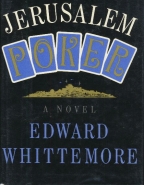
|
|
A twelve-year poker game played for the control of
Jerusalem's black market is the centerpiece of this novel.
Any similarities to Tim Powers are strictly coincidental,
but certainly applicable. Fans of Powers who liked 'Declare'
should give these books a try.
|
Whittemore's saving grace is his sense of humor. He infuses all
the books with both clever intellectual jests and bouts of screwball,
physical humor. He brings to mind the best of Vonnegut's jokes,
though he's otherwise little like him. It's a written style, not a
content similarity. Both writers uses a similar linguistic structure
to tickle the reader just often enough, ensuring that no-one waits
too long before hoisting another drink.
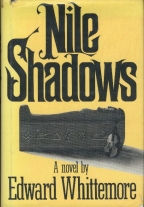
|
|
'The Panorama Has Moved'. A character in 'Nile
Shadows' finds a sign with this message in an empty lot
overlooking the harbor. The phrase has always haunted me.
|
'The Jerusalem Quartet' is also gifted by Whittemore's fantastic
imagination. He weaves fearlessly from superstition to supposition to
inspiration as he tours faiths, religions and exotic locales. His
Irish seventh son will end up wearing a fez and playing a poker game
for twelve years to win control of the black market in Jerusalem.
Whittemore can go from a smirk to a scream effortlessly, and the
reader won't know until the smell of burning flesh rises. He works
more the 'magic realism' side of fantasy, never elaborating a strict
set of rules for supernatural elements, instead greeting them as if
they're just part of the everyday lives of some rather eccentric
people. It's a trick used by writers such as Tim Powers, whose
'Declare' is another fine work of Middle Eastern weirdness.
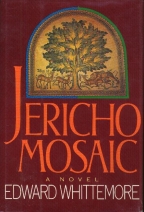
|
|
Edward Whittemore's conclusion to the Jerusalem
Quartet, one of the great lost pieces of undiscovered
literature.
|
Unfortunately, that lopsided 'Lord of the Rings' comparison
probably help sink this series into complete invisibility. In
fairness, the books are probably too 'normal' for a crowd expecting
elves and sorcerers, and too weird for a college professors to teach
in literature classes. They're fairly difficult to find, and will
continue to be so until they're released by Old
Earth books, the people who brought you Patricia Anthony's short
story collection 'Eating Memories' and the recent re-releases of the
E. E. "Doc" Smith novels. According to Michael Walsh of Old Earth,
with luck they should be available this summer. It's fantastic to
hear that these books will be made available again to a new reading
public.
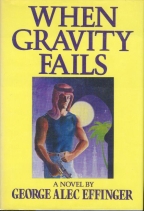
|
|
George Alec Effinger hit a home run with his 1987
effort 'When Gravity Fails'. The title is taken from the
lyrics to Bob Dylan's 'Just Like Tom Thumb Blues'. It's NOT
cyberpunk.
|
My next stop in the Middle East came in the prime year of the
cyberpunk boom, 1987. Veteran SF writer George Alec Effinger
surprised all the young turks and old fans with 'When Gravity Fails'
(1987), followed by 'A Fire in the Sun' (1989) and 'The Exile Kiss'
(1991). Set in an Arabic ghetto called 'the Budayeen', they tell the
story of Marid Audran, who starts as a street hustler and ends up a
policeman. Though due to the timing of their release, these novels
were generally lumped with the cyberpunk crop, they're really not
cyberpunk, and they are not the products of the cyberpunk community.
Effinger was an old hand before most of the cyberpunk authors were
reading, and his sensibility is rather different. If you take the
vibe of the movie version of 'Blade Runner' piped through a Middle
Eastern sensibility filter, then you're getting a much better idea of
what Effinger has to offer in these novels. They're a pitch-perfect
combination of the Phil Dickian science fiction and Chandleresque
noir.

|

|
|
The cover of this novel appears to be heavily
influenced by the movie 'Blade Runner'.
|
Curiously enough, you can get the second and this, the
third novel in Effinger's series, but not the first book. Is
somebody paying attention to this?
|
But more than anything else, they really hit home with their
Middle Eastern bias. Like Durrell and Whittemore, Effinger milks the
Middle East for every bit of dripping, corrupt atmosphere he can get.
He also keeps his hero resolutely downtrodden. There is no
world-saving going on in the Budayeen. There's a lot of drug
addiction, sexual addiction and dirty little secrets enough to keep
the reader glued through three heaping helpings. Curiously enough,
only the latter two novels are in anything remotely resembling
"print". The first is well out of print, when it should be pumped
across bookstore shelves in wonderful, deluxe, illustrated editions.
Fortunately, they're still pretty readily available used, and they
will not require the sale of a limb of organ, even though they may
describe that as status quo.
The latest author to enter the Middle
Eastern strange fiction arena is Jon Courtenay Grimwood. Last year he
started with 'Pashazade:
The First Arabesk', nominated for an Arthur C. Clarke award, and
he's just released the follow-up 'Effendi:
The Second Arabesk'. Drawing from a rich line of predecessors
they meet the standards of their forebears. They acknowledge their
heritage as well: both books mention Durrell's works on the jacket
flaps, and like the works that came before them, they acknowledge
that the place is a character in itself. The Middle East has hooked
Grimwood and not let him go.

|
|
Jon Courtenay Grimwood's 'Pashazade' has a fantastic
trailer created for the web. It will make you want to read
the book and see the movie. Alas, the book has not yet (to
my knowledge) been optioned. It should be!
|
But it's not exactly the Middle East we know. The Arabesks are set
in an alternate history, where Germany won the First World War, and
the Ottoman Empire still rules the Middle East. In 'Pashazade',
ZeeZee, a genetically and software enhanced kid from Seattle leaves
town in a cloud of bad blood, on the run from a one-time benefactor
who is now intent on his death. He is brought to El Iskandryia by an
aunt he never knew he had, and set up as one half of an arranged
marriage. Grimwood plunges the reader into this tale of identity,
growing up and the temptations of power with gusto and just enough
mystery to make the world he paints seem larger than the characters
who experience it. That's a tricky line to tread, but Grimwood does
it to perfection.
Never less than compelling, 'Pashazade' and 'Effendi' combine so
many genres so seamlessly that readers' heads will spin if they ever
let themselves have a chance to think about it. But such is the craft
with which the books are written that most readers will never even
get the chance. Like Durrell, Grimwood has perfected the place as
character move, and he uses it to fill the readers' perceptions to
the edges and beyond. He writes a heck of a noir mystery, and his
alternate future is a gritty, entertaining mix of past, present and
future jumbled together in the streets of an ancient city. The
antiquity can never be subsumed by the present or future. Bits of
technology float like shiny plastic wrappers in a harbor crowded with
fishing boats.

|
|
Jon Courtenay Grimwood's 'Effendi' makes the most of
the world and especially the characters he created in
'Pashazade'.
|
However, all of this would be for naught if the readers didn't
like the characters. Here's where Grimwood departs from all his
predecessors in a way that's really clever and really works. His main
character, ZeeZee/Ashraf Bey would be right at home in any novel,
from Justine to 'Sinai Tapestry' to 'A Fire in the Sun'. He's moody,
alert and lives on the edges of reality, as likely to snort a packet
of crystalmeth as to knock back a cup of mud-thick coffee or a
tumbler of whiskey. However, he's surrounded by characters who are
much more grounded and just plain likable. Grimwood develops an
enchanting relationship between Ashraf and his nine-year old niece
Hani, the obligatory computer-genius kid. Such is his craft that she
never seems annoying or grating or patched on. Ditto for Ashraf's
intended wife, Zara. She's just a bit more grounded and yes,
endearing than Ashraf. Finding these nice, normal, likable characters
in the middle of Grimwood's hermetic stew is delightful.
Grimwood's done something
worth noting on the web as well. He's created a flash movie trailer
for 'Pashazade' that will make you want to read the book and pray
that it becomes a movie. It's the best trailer I've seen for quite
some time. You can find it at:
http://www.j-cg.co.uk/pasha.htm
I've kindly put this URL on a line by itself because you'll
certainly want to email it to more than one person. It's a knockout
job, and very clever. It doesn't hurt that Grimwood's novels are both
lower priced (£12.99) and nicely designed by the Earthlight
imprint of Simon and Schuster. If books have to compete with movies
for our attention -- and they certainly do -- then there's not reason
they can't avail themselves of the tools used by movies. Grimwood is
to be congratulated on the excellent programming and art direction of
his trailer. And yes, I do want to see the movie!
From Durrell to Grimwood via Whittemore and Effinger, readers can
easily sink themselves in classic Middle Eastern-oriented literature
that's really weird, but really good. Look for the Whittemore novels
when they appear later this year, or better yet, start out now and
track down the paperbacks. You'll definitely be glad you did. Clamor
for the re-release of the Effinger's Marid Audran books. Sweep the
shelves clean of instant karma. In one small corner of the world, in
one small city on the planet, readers can find a wealth weird reading
that will keep them entertained and challenged, educated and
understanding of not just some sterile facts, but learning just a
little bit more about the human heart. The human heart, as it is so
often spoken of, is not real. It doesn't exist, except in books, and
families and lives. Keep reading and living.
Thanks,
Rick Kleffel













